|
|
2019
Asia Regional TTE And Working Meeting of ALIVE Associates, Nakornpathom, Thailand; 8 - 10 August 2019
A successful meeting of ALIVE Associates and Focal Points for LVE within Asia took place in the Faculty of Education, Silpakorn University, Nakornpathom, Thailand. The meeting involved 13 people being representatives of ALIVE Associates, Focal Points or interested individuals from Hong Kong, mainland China, Sri Lanka, Thailand, Singapore, Malaysia, Vietnam and Indonesia. The key objective was to strengthen networking among Associates/Focal Points in Asia through sharing of good practices on implementing LVE, instigating collaboration and providing an update on recent developments. Led by the President of ALIVE, Chris Drake, and with enthusiastic participation by all, this first Asia Regional Working Meeting was productive, stimulating and refreshing and gave a helpful boost to LVE efforts in the region.
"Connection with the Associates and Focal Points from around Asia in formal and informal interaction allowed me to learn a lot. This get- together session allowed me to feel their passion and team spirit and has inspired me to do my little part in my community."
-Joyce, Singapore-
Immediately before the meeting a LVE Train the Educator Workshop (TTE) was conducted from 6 - August 2019 for an enthusiastic cohort of teachers and other educators in Thailand, including a Buddhist monk, and four additional participants who travelled in from Singapore, Sri Lanka and China for the occasion as part of the preparation to become an LVE trainer in their own country.
Expressing heartfelt thanks to the Faculty of Education, Silpakorn University for their kind hospitality and the venue, the meeting closed with a warm endorsement of the proposal to meet again next year with a similar format of a working meeting amongst experienced practitioners and a TTE for those less familiar with LVE.

"The need to view the world through a prism of values has never been greater and values must have pride of place within all aspects of education, not only setting the tone for everything that happens within the learning environment but also ensuring that what one might call "values literacy" is an indispensable educational outcome. The LVE Approach places the search for meaning and purpose at the heart of education and recognises that teachers need to be supported in their work and valued, nurtured and cared for within the learning community. In this regard, there is much that ALIVE Associates in Asia, with the region's strong emphasis on the importance of education and values, have to offer."
- Chris Drake -
LVE Flourishes from North to South!
LVE Inspires Teachers at Sarasas Affiliated Schools
Inspiring teachers to see how valuable their life is was the focus of an event on 18 April 2019 at one of the Catholic Sarasas Affiliated Schools. An important message conveyed was that each and every one of us is or can be a source of love, truth, peace and contentment in the world around us, whether in the classroom or at home. As Associate Professor Prapa Vittayarungruangsri, Focal Point for LVE in Thailand, said in her report to us: "It's time to learn how to love and respect what is sometimes referred to as one's "inner child" - the pure, innocent, and unconditionally loving aspect within our being that is often ignored.
To do this we now need to create a certain deep inner quietness for the process of listening and healing to begin. The story of an eagle who was born among chickens, "a story about being who you are", was narrated to motivate teachers to think of their positive qualities. When we see and communicate with these inner qualities, we can reach our potential and avoid the mistakes we sometimes make. Life becomes like a golden rose that spreads the fragrance of values such as positivity, responsibility, respect, love, simplicity and peace)."
LVE cards were distributed as a tangible reminder of the qualities of each participant. In closing, Ms. Sansook, Head of Academic Administration, said that the event really invoked the spirit of motherly love and care in the teachers which would be passed on to the pupils through values-based relationships.
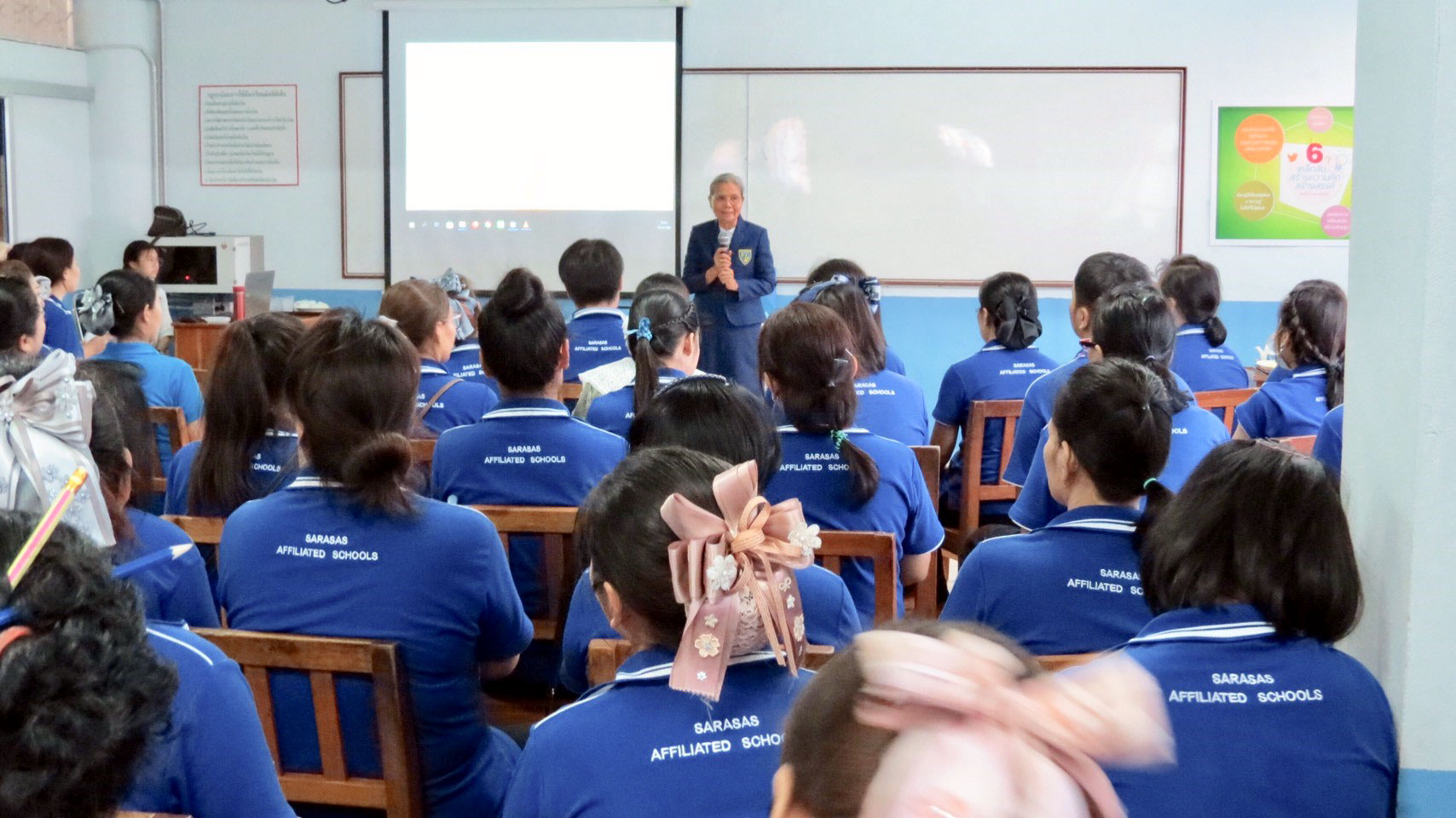
Associate Professor Prapa Vittayarungruangsri, Focal Point for LVE in Thailand, introduces LVE to the teachers
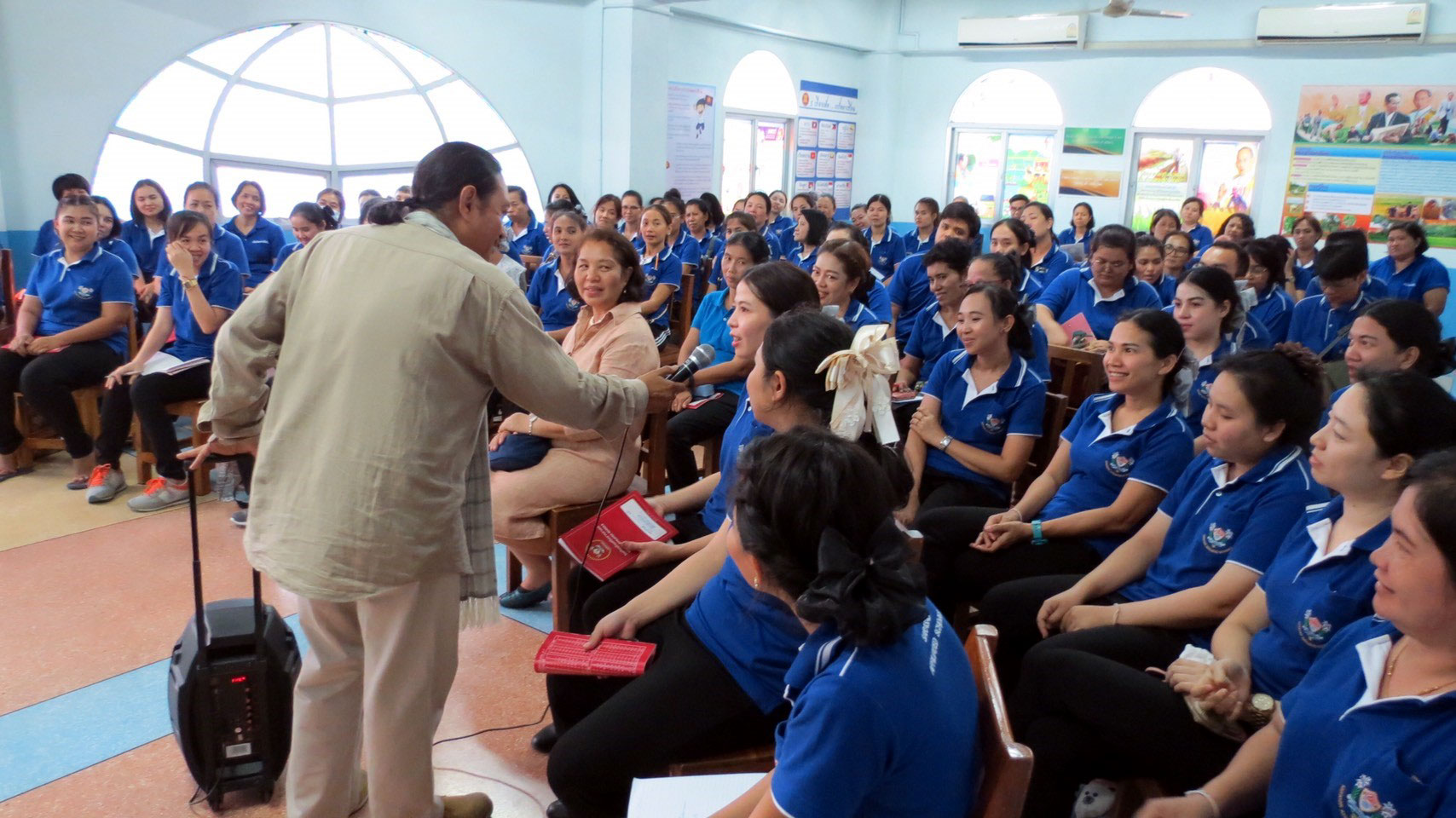
Mr. Supalak and participants

Ms. Sansook, Head of Academic Administration (front row, far right) and school administrative team, with Associate Professor Prapa Vittayarungruangsri, Focal Point for LVE in Thailand (front row, far left)
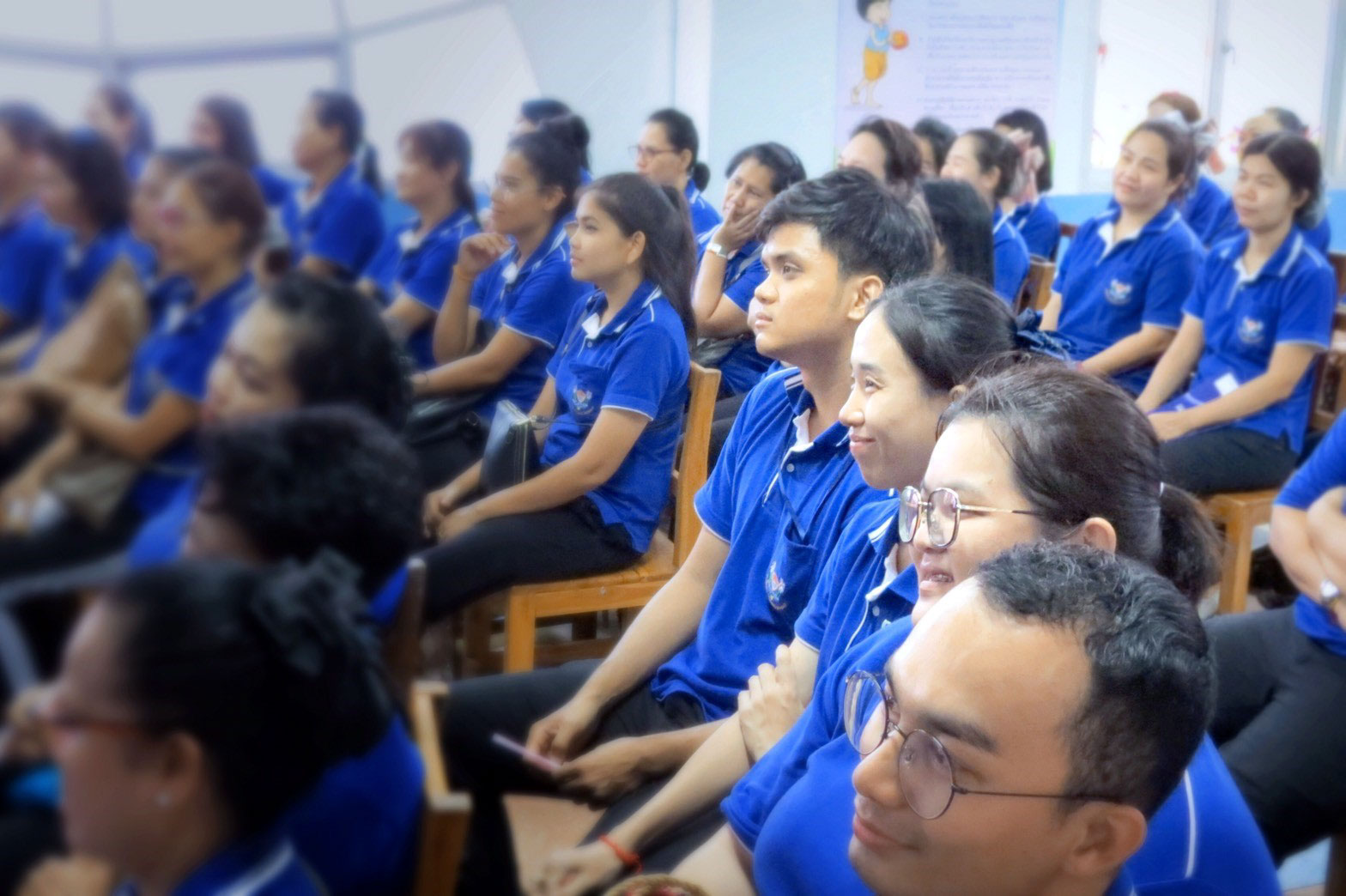
Teachers' responses

'Generosity' value card

The power of self realization: If there is no realization of the true self, then, the highest potential and true power cannot emerge fully.
LVE resource materials include many values-based songs that can be helpful in creating and maintaining a values-based learning environment and foreign kindergarten level teachers in the English language programme at Sarasas Witaed Ratchaphruek School in Nonthaburi were introduced to some of these on 8 May 2019. The participants enjoyed themselves singing and acting along as well as experiencing peace within themselves.

Introducing LVE songs to foreign teachers at kindergarten level in English program

Introducing LVE songs to teachers at Sarasas Witaed Ratchaphruek School (above and below)


"Happy Children, Happy School, Happy Home" in Chiangmai
In Chiangmai, in the north of Thailand, a project called "Happy Children, Happy School, Happy Home" was launched in June 2019 in Rajprajanukror schools in the patronage of the late King Rama 9 in north and north-eastern Thailand. The project involves primary and secondary school students, their teachers and parents and the team includes Pinthip Yangchareon, Pintip Juntharathep, Punika Chinawatra and Teeraporn Chinawatra.

Drawings (above and below) of the "School of My Dreams" created at Ratprajanukror School 50, in Khon Khaen province, north-eastern Thailand, with a list of 15 values to live by, including cleanliness, confidence, stability, kindness, cheerfulness, peace, dedication, perseverance, light-heartedness, humility, tolerance, generosity and discipline.


Punika Chinawatra and a group of parents interested in values self-development
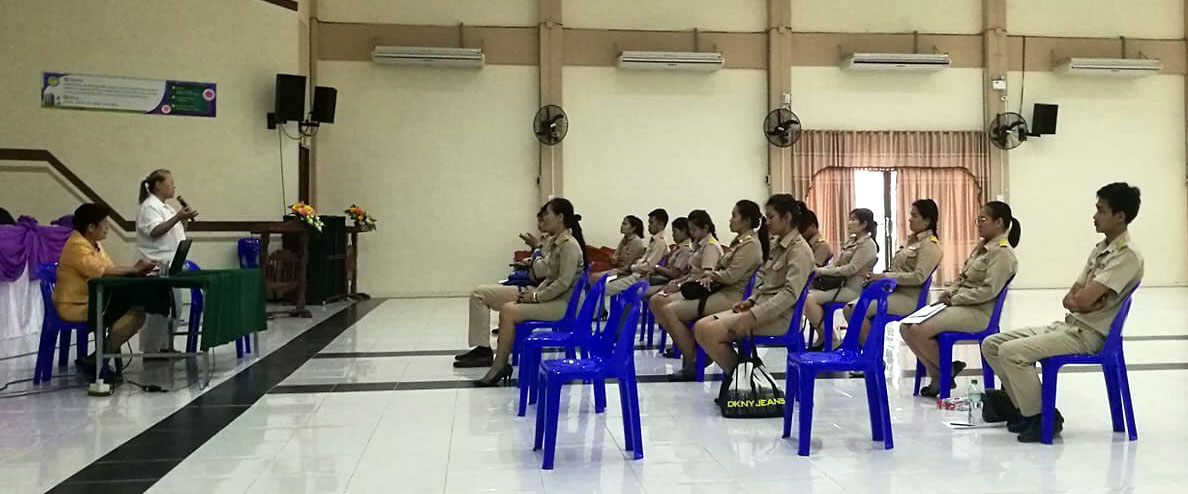
B. K. Pinthip Yangchareon and Dr. Pintip Juntarathep talked to school teachers in the uniform of government officers about using values activities at schools.
LVE is introduced in University course on Muslim Education and Humanity
Pattani is one of the provinces in the south of Thailand that has been affected by terrorism and in its efforts to dispel fear and insecurity the Department of Education, Muslim Education and Humanity, Prince of Songkla University, Pattani campus is using LVE in the 2019 academic year as reference materials for discussion with students to help build an atmosphere of peace and stability.

Prince of Songkla University students discuss and explain their understanding of values, giving practical samples of how to use them in real life situations (above) and receive course certificates (below).
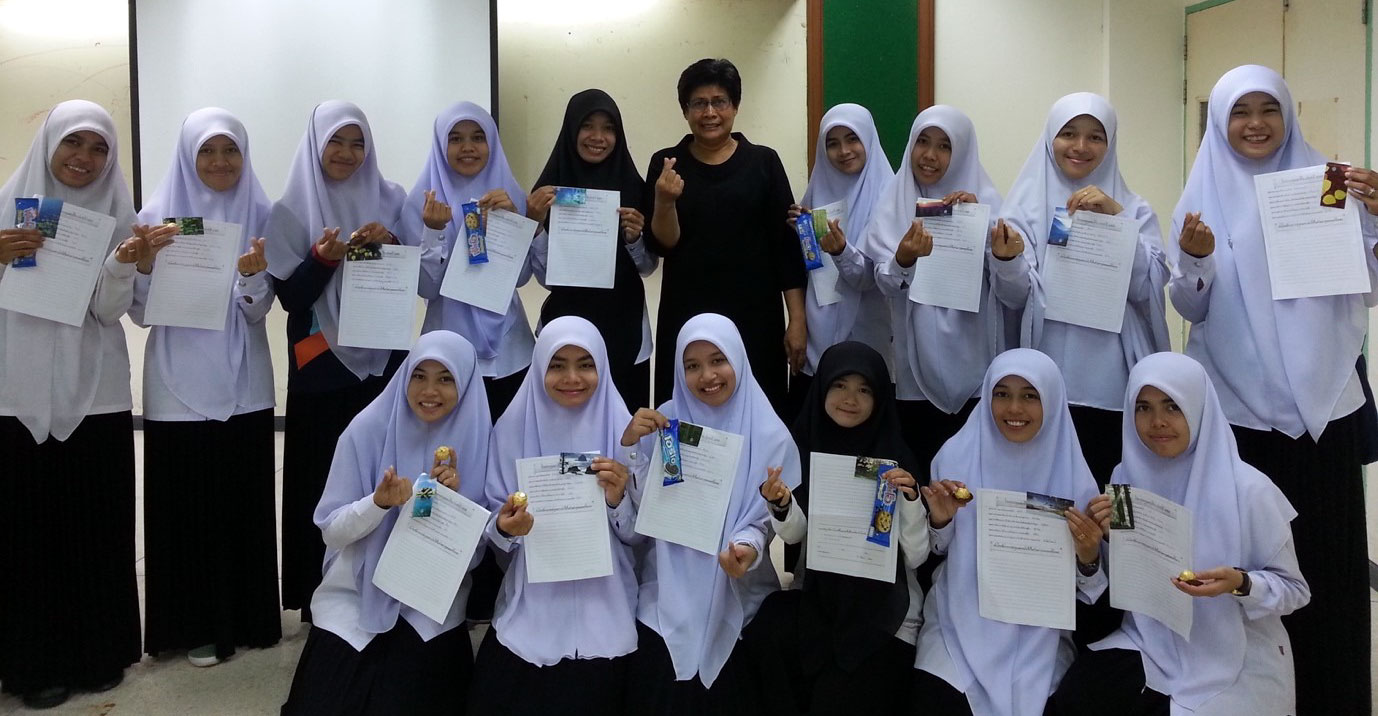

Living Values Education Helps Students Grow and Glow
Living Values Education activities have been implemented at Banklong Bangkrajan Elementary School, Nakornprathom, Thailand to promote the "School of Virtues" project, which is being implemented in primary schools under the Office of the Private Education Commission of the Ministry of Education. The aim of the project is that schools should develop smart/good persons with morals and desirable behaviour and the school has been using LVE activities as the tool to bring about changes in the behaviour of the children from kindergarten to Primary 6. The teachers found that the lesson plans in the activity books are useful and help make their work easy and enjoyable and as a result the students grow and glow day by day.....
2015
Conflict Resolution at Sarasas School
"As the aim of this school is not only teaching of literacy and numeracy but also promotion of spiritual, moral, social and cultural development, Living Values Education activities are integrated into teaching basic subjects and extra-curricular activities," reported Prapa Rungrangsri, the Focal Point for LVE in Thailand. "In the past academic year, I used conflict resolution steps with students and they work very well. For example, after the conflicts were solved, a girl in Year 7 said, "In the beginning of summer, I felt angry at him every day. Today I feel calm and happy." The boy said, "I used to be revengeful. Then I felt it had become less. Now I feel better than before. Now I feel free."
Ms. Rungrangsri will be introducing the Peace Unit and LVE conflict resolution steps to both Thai teachers and foreign teachers at this school and other schools in the affiliation in Educational Area 3, as well as giving support so that the solutions are provided consistently. This will happen throughout the school academic year, starting in May 2015 and continuing through March 2016.
2014
An Overview of LVEP in Motion in Thailand from 2010 to 2014
Thailand's current Focal Point for Living Values Education, Prapa Rungrangsri, presented a set of the five published Living Values Education books to her friend who worked at the Office of Educational Council after she returned from an international LVE Workshop.
With UNICEF support, in 2010, Thailand adopted the use of Early Childhood Learning Development standards which set measurable knowledge and activity levels for children 0 to 5 years of age. These standards are now being employed by teachers and professionals working with young children through educational institutions and educational service areas throughout the country. Quoted is as follows:
Standard 1: children should have virtues, morality and desirable values.
Indicators:
- Discipline, responsibility and performance of agreed-upon rules.
- Honesty
- Sense of gratitude
- Living kindness and good perception of oneself and others.
- Thriftiness and keenness to engage in worthwhile use of personal and private resources and environment.
- Good manners and observance of Thai customs
(Reference : Early Childhood Education Standards for Internal Quality Assurance, Office of the Basic Education Commission, Ministry of Education)
LVE is currently implemented in many areas in Thailand.
- At Sarasas Witaed Ratchaphruek School where LVEP was introduced, in each classroom, the 12 values are displayed. About 3,000 teachers and students from Grades 1 to 12 learn to use each value in their life. During the homeroom period from 8.00 to 8.15, students sit in meditation with thoughts about values. This school is located at 90 Bangtanai District, Highway 345, Pakkret, Nonthaburi 11120, Thailand. This school is in affiliation with other 32 schools belonging to The Yongkamol family.
- Prapa Rungrangsri presented 100 copies of LVEP Activities Books to Dr. Sutthipong Yongkamol, Director of Sarasas Witaed Romklao School. He is very interested in values education and found that LVEP offers practical aspects of education.
- A workshop titled "Living Values Education Program: Concepts and tools" was held from 15-18 June 2010 by Dr. Patcharaporn Panyawuthikrai, a dentist and an early childhood specialist together with Ms. Krisda Cholwiriyakul, a clinical specialist in psychology. They introduced LVE to a group of officials from the Ministry of Human Resources and Society Development. This group of government officers who take care of the welfare of children in 26 provinces use LVE in their field projects.
- 29 March through 1 April 2011: As the LVE extension project of Ministry of Human Resources and Society Development organized by Mr. Yothin Rodprasert, 120 officers were trained to use the Living Values Education activities books.
- 19 January 2011: Ms. Krisda Cholwiriyakul conducted a workshop titled "Changing the Organisational Vision and Culture into One of Working with Happiness" for 11 officers of the 4th Mental Health Centre, Department of Mental Health, Ministry of Public Health. As a consequence of this, such a workshop continued once a month for the whole year. The 12 values were explored and plans of taking action were made by the group for implementation at their working places.
- Asst. Prof. Pinthip Chantarathep (BK Pinthip) at Songklanakarin, Pattani Province campus has been using LVEP with all her classes. She attended the Train-the-Trainer Workshops in Oxford during the time she studied a course in the U.K. She used to help Dr. Anchulee Suwandee, former LVEP Coordinator for Thailand. She has a big collection of activities which she has run for many years at her university and other places in the southern part of Thailand. You may have heard about terrorists in the four provinces in the south; Pattani is one of them. Living Values Education definitely gives hope to hopeless ones. No matter what, Pinthip still keeps on promoting LVE.
- 11-12 October 2012: The LVE team coordinated by Miss Rapeepat Wongpakdi (BK Eung) organized a train-the-trainer program called "Project Promoting Living Values" for the personel at the Juvenile Observation and Protection Centre in the Lampang Province of Thailand. The Living Values concept has been integrated into the activities organized for particular cases instead of giving punishment.
- Ms. Narerat Ancharepirat, Managing Director of Inthanon Publishing Limited, showed her interest in LVEP activity books. She said they are good to help teachers teach values in integration with any subjects taught in schools.
- October 2011: The LVE team, coordinated by Mr. Pramote Suwanno (BK Pramote) introduced the program to representatives of the Indian Embassy in Thailand which would grant funds for children with Down's Syndrome. Children from the Light of Wisdom Foundation (active for children with mental retardation) performed LVE activities on stage. The representatives from the Indian Embassy witnessed that the children were very happy when they were singing and acting as a star in the Star story. The Foundation received the fund and other aids
At present, Mr. Pramote Suwanno still teaches the children at the Foundation. Click here to see the script of the program on that day.
2009
Educators' Training at Assumption College, Nakornratseema - October 2009
Two kindergarten teachers at the school after attending Educators' training in Bangkok had an interest in organising a one-day training for 32 teachers at kindergarten level on 9th October 2009. The Director of the school presided over the opening ceremony and emphasized values development in both teachers and children for their life upliftment as the name "The Assumption" implies ( the bodily taking up of the Virgin Mary into heaven).

Through self-reflection and discussion on the meaning of values on "peace", "respect" and "love", they experience those values themselves. Songs, role-playing on conflict resolutions were tried out to find the best way for presenting them in the classrooms. For the values "happiness" and "cooperation" , participants did the activity called " Building a Happy Home" . They were divided into groups of 4: parents and kids. The kids were put in another room while the parents were designng the house.Then, the parents were asked not to speak when the kids came in ; they needed to read the instruction only. Both role-players as parents and children shared that as parents, they wanted to guide their kids at each step or corrected them immediately when they went the wrong way; as kids they said that to a certain extent they were happy to follow the instruction but they wanted space for their own creativity as well. As teachers , they realized how their students feel if they were limited in expressing their own ideas and values. In conclusion, they would like to recommend that teachers should know the importance of creating the environment to enhance values development in students in the natural way.

10-11 Nov 2009 - Introduction of the Concepts of Values to Personnels at Institution of Observation and Protection of Children and Youth.
Lampang Province.
News on Educators' Training from Thailand - August and September of 2009


9 Nov 2009 - Setting Up - Values Corner for the theme: Body&Soul at School for Life.
Chiangmai
Two one-day workshops were conducted in August and September of 2009 on "Brain-based Learning, Emotional Quotient and Living Values Educational Program". The first was on 8 August at the Kindergarten Teachers Association in Bangkok and was conducted by Trish Summerfield and Assistant Professor Prapa V. Rungruangsr. The second was on 12 September and was conducted by Associate Professor Dr. Patcharaporn Panyawuttikrai in Lopburi province. The workshops gave the opportunity for 130 educational officials and key teachers working with students at pre-primary, primary and secondary education levels from public and private educational institutions from different parts of the country to better understand values and values-based education, so that they find ways to integrate values into their existing curriculum and test the ideas, methods and resources presented to them.
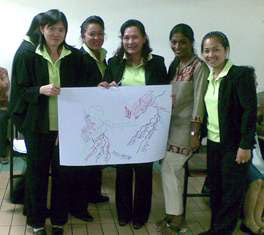

As brain-based learning and emotional quotient are the current issues of interest in the curricular and extra-curricular arrangement, Living Values Education was introduced as an integral part of the learning process to enhance emotional intelligence development in individual learners. The contents of the workshops included values awareness, values-based learning activities, samples of materials and evaluation. The workshops ended with the question and answer sessions and reflections by participants. The teachers felt they were well-equipped with tools to re-construct the child friendly learning environment based on values at their schools and communities as they were fully aware that children learn what they live.
26-27-28 June 2009 Educators Training at Mae Sot, Tak Province,Thailand


At the Thai-Burmese border at Mae Sot district in the north-western part of Thailand, on the vast plain behind the mountain range is located a small migrant school called "Light School" founded and run by a group of volunteer : People Partner for Development and Democracy where there was the call for LVEP for 12 teachers and 120 students.Trish Summerfeild from Vietnam was invited to run the 3-day traning.The Peace Units with 22 lessons were chosen to be introduced to this group of students who were affected by conflicts and war. English was used as the medium of instruction but translation did not make it less in conveying meaning. There were also Thai educators from Chiangmai, Lampang and Bangkok came to observe and attend the training. The training was more on the practical part as there included reflecting ideas, peer teaching , group working and using the teaching materials in classroom context.
At the end, all trainees received certificates and made commitment that they themselves keep exploring the meaning of values, experimenting it themselves and making it a reality . Then, through them students will also learn and live those values in their lives.

"To help someone be strong inside with his/her own living values is the first step in the direction of his/her dreams of life. No matter who they are, everyone is unique and always gets chances of light in this small school of Burmese village in Mae Sot. I'm glad, happy and peaceful to be a part of Light School's development." said Dr.Pattcharaporn Panyawithikrai ,one of the participants from Bangkok.
"I believe that LVEP curriculum will remove poison from the human mind of both children and adults", shared by Mr.Pramote Suwanno, a lawyer who has full hope in LVEP in educational development.
2005 July

Living Values Education Programme continues to grow in Thailand. Many LVEP Educator Trainings have been held in Bangkok, in the north of Thailand, and in Pattani, and interest is increasing on all sides. So far, more than 1,500 teachers and educators from various schools and universities throughout the country have attended the LVEP Trainings. This year, a school that implemented LVEP for two years, the Kasem Pittaya School, received the Royal Award offered by the Ministry of Education.
In the northeast, educators with the Karen tribe also use LVEP materials, both the Living Values Activities for Refugees and Children Affected by War materials and the materials for regular students. Annual trainings have been taking place in different camps since 1999.
Bangkok
Regular LVEP Educator Trainings began in Thailand in 2002. A one-day educator training program was held on March 1, 2002 at Saint Hospital for about 50 teachers from Catholic schools. To fulfill the interest of Thai teachers, the first formal five-day LVEP Train-the-Trainer was held April 22 - 26, 2002, hosted by Srinakarin Virot University, a well-known public university. About 35 teachers from nine Catholic schools and one international school, and 20 educators from the university attended. Most of the participants expressed that the training helped them explore their own values as teachers and improve their teaching performance. They showed interest and enthusiasm to make use of LVEP.
In August of 2002, two-day LVEP Educator Trainings were organized, hosted by Bangkok Bilingual School. Eighty-four teachers from 17 schools in Hoaw-Kwang Community attended the training. The teachers enjoyed the activities and could really see that they could be integrated in their classes. Most participants also enjoyed learning about skills to create a values-based atmosphere, such as acknowledgement, active listening, conflict resolution and collaborative rule making.
LVEP Educator Trainings started to take place in Kasam Bundit University on a regular basis after Diane Tillman presented LVEP and its theoretical model to the President of Kasam Bundit University, faculty members, a group of vice presidents of academic affairs of various private universities in Bangkok, and interested educators on October 14, 2002. Since then, six trainings have been held. Invitations were extended to various schools in Bangkok as well as other provinces throughout the country. About 500 teachers attended these trainings; educators ranged from teaching at the kindergarten level to university level. Most participants enjoyed the activities and the happy, peaceful atmosphere. Participants commented:
- The training enabled them to gain insight into the process of teaching values; this can be used in the classroom as well as in daily life.
- The training enabled them to gain insight into the process of developing oneself from within; a better person will definitely create a better society.
- The training enabled them to have direct experience with value activities which are fun, relaxing and elicit peace and happiness.
- The values activities enabled them to realize their own inner qualities, a starting point of positive and creative thinking.
- The values activities provided a chance to work together in unity, to express one's own ideas and to give respect to others.
A one-day LVEP Parent Workshop was led by Diane Tillman on October 13, 2002, hosted by the Bangkok Bilingual School. About 40 parents and interested people attended. They all had fun and gained deep insight on becoming better parents.
Four schools in Bangkok have organized two-day LVEP Educator Trainings for their teachers. They were:
- Lert-La School: May 3 and 4, 2004, for 200 teachers.
- Vat Tham-Mongkol School: May 5 and 6, 2004, for 30 teachers.
- St. Joseph Bangna School: October 5 and 6, 2004, for 150 teachers.
- Technic Vimol School: December 18 and 19, 2004, for about 35 teachers.
North of Thailand

Prae Province. A one-day LVEP Educator Training was organized for all 53 teachers at Song Pittayakom School on July 25, 2002, in Prae province. The training was very well-received. The Director of the school, Mr. Preecha Bumbut, fully realized the importance of value teaching and thus participated throughout the day. During the opening ceremony, he said that it is the policy of the national educational reform that teaching values be integrated in all subjects of the curriculum, hence the training came at the right time to help provide teachers with guidelines and methods to teach values to students. The teachers participated in all activities with zeal and enthusiasm. Here are some of the insights and experiences of the participants:
- Values activities are tools to develop positive thinking and value one's own self, others and the society at large. Each individual learns to live together in peace and harmony.
- The training provides new insights and guidelines as to how to integrate values teaching in the classroom.
- To develop values in students, teachers have to develop them in themselves first.
- The training helps teachers know how to create a values-based atmosphere which enables all to be peaceful and happy, and to feel valued, respected and loved.
Chiangmai - Three LVEP Educator Trainings took place in the following institutions:
- Two-day LVEP Trainings, hosted by Chiangmai Kindergarten School, were held December 28 and 29, 2002, with 52 participants from nine schools.
- Three-day trainings, organized by the Faculty of Pharmacy at Chiangmai University, were held April 21-23, 2003, for 40 participants (30 faculty members and 10 teachers from three schools in Chiangmai and one school from Chiangerai province ). Most participants showed keen interest in the program and actively planned to make use of it in their teachings. Many stated that they enjoyed the peaceful and relaxing atmosphere and gained insight into the benefits of positive and creative thinking and the process of imbibing values both in themselves and students.
- Two-day trainings at Sacred Heart College were organized on July 15 and 16, 2003, for all 250 teachers at the school. Most of the teachers enjoyed the activities and especially liked the relaxation/focus exercises. They said they felt that LVEP activities could be applied and integrated into the existing curriculum.
Surprisingly, one of LVEP's less known programs was the first curriculum used in Thailand in a refugee camp. In 1998, Rachel Flower held a LVEP workshop in Chiangmai for a group of 14 NGOs. This was the seed for implementing LVEP's Living Values Activities for Refugees and Children Affected by War (LVARCAW) in Karen refugee camps along the Thai Myanmar border. In May of 1999, Rachel Flowers and Diane Tillman conducted a training for 35 refugee teachers in a camp toward the north of Thailand. The numbers of Living Values teachers grew in the camp with subsequent follow-ups and training. Teachers and students reported very positive results at all levels and in all relationships. The decrease in aggression and increase in respect and cooperation was visible and rewarding to both teachers and students.
Over the years a small group of Karen refugee teachers have taken responsibility for conducting the two week training program for LVARCAW teachers, led by the continuing efforts of Rachel Flower and Bharati Ramakrishnan. Currently, Karen teachers from other Karen camps are being trained through the generous support and cooperation of ZOA, a Dutch-based NGO. Many thanks to ZOA, and Rachel Flower and Bharati Ramakrishnan, who continue to offer follow-up support and monitoring.
South of Thailand
Pattani - Three LVEP Educator Trainings were organized in Pattani as follows:

- Two two-day LVEP Educator Trainings were held for five municipal schools on March 28 and 29, 2003 and April 1 and 2, 2003. There were about 90 teachers from three schools in the first session, and about 70 from two schools in the second one. The Mayor of Pattani performed the opening ceremony. After the training, he stated that this exactly corresponds with the new policy of the educational reform and that the schools should try to make use of it.
- Another two-day training was organized at Songkla-Nakarin University for interested teachers on November 16 and 17, 2004. About 30 teachers from various schools in Pattani attended.
Number of Sites Using Living Values Education
Total number of sites 150
Some teachers at 150 sites have received LVEP Educator Training. At a few sites, all the teachers have been trained and they are implementing LVEP school-wide.
Universities: 18
Colleges (including Teacher colleges): 20
Schools: 112
Impact
The Recipient of the Annual Royal Award offered by the Ministry of Education
The educators of Kasem Pittaya School decided to apply for the annual royal award offered by the Ministry of Education after two years of implementing Living Values Education Programme. The story began with all the teachers from the school attending a three-day LVEP Educator Training at Kasem Bundit University in April 2003. The school began to integrate LVEP school-wide in May 2003. The principal set up a Living Values room for students and arranged extra hours for each class to come in and take LVEP lessons. After two years, the school was evaluated according to the criteria set up by a committee from the Ministry. Student performance in morality had improved at a high level and they achieved the required standard in this area and in many others. The school was given the annual Royal Award for 2005 by Her Royal Highness Princess Maha Chakri Sirintorn on June 13, 2005. The principal said LVEP had contributed a very important part in uplifting teachers, students and the general atmosphere of the school.
Ms. Ratri Kamkiti, the schools head of Academic Affairs, reported: Due to LVEP, the students moral behavior has improved. They became better persons and can live with others happily and peacefully. There's no more fighting in the school. They learned to forgive and act calmly. They are better in terms of honesty, tolerance, cooperation and compassion, and they have good manners. They have more respect for seniors, juniors, friends, parents and teachers. They became more enthusiastic to learn. All the students love the LVEP lessons and enjoy themselves a lot in taking part in LVEP activities.
Ms.Ratri Kamkiti also told the following story: The conflict resolution technique proved to be effective. There were two girls who disliked each other for some time; this soon escalated into a fight. They beat each other in a restroom and so I used the conflict resolution method with them. Now they no longer fight and have become close friends. They are together most of the time now.
Ms. Sriwan Saifah, the Principal of Kasem Pittaya School, indicated improvement in all areas on the whole school indicator form. There were gains in student attendance, student tardiness, the transient rate, and teacher attendance. There were academic gains in reading, language and math. On a scale of 1 to 10, 10 being outstanding, she rated the school before implementing LVEP as 5 in school climate, 6 in student courtesy, 5 in caring and respect, and 6 in staff cooperation. After one year, the respective ratings were 7, 7, 8 and 8. After two years of implementing LVEP, the ratings were 8 in school climate, 8 in student courtesy, 9 in caring and respect, and 9 in staff cooperation. She noted that the school would like to share this experience and greatly appreciates the LVEP program in trying to help children, society and the world at large.
Living Values Education with Karen Tribe Refugees
The following results are taken from interviews with Karen teachers in a refugee camp. For a full report, kindly see the article, Educating for a Culture of Peace in a Refugee Camp.
Every teacher spoke about the changes in their students. They frequently noted that the students were interested in the Living Values lessons. All of them spoke of increases in participation and expression. Their comments included:
The students now dare to speak.
They share their pictures now, before they would just be quiet.
Before when a camp leader would come to the class they would be quiet, now they not only dare to speak, they ask questions.
The teachers noted increases in respect and/or love and friendliness in the students, for their peers, and teachers. Many said they were more obedient and tried harder. They said that the children were happier and the sad students were less sad. Some students when they saw conflict (in other students), they said, Oh, we learned about Living Values we don't do that." and they taught the other students conflict resolution.
All of the teachers said the students fought much less frequently, and ten teachers said that their students now did not fight at all. A woman teacher who had done the most lessons, said of her twelve to sixteen year-old students: "Before they had this training they used to get angry quickly, not forgive each other quickly, and some were cruel. Now they do not anger easily and forgive each other, and they are not cruel, they are patient. Now, there are no fights. They try harder, are friendlier to me, and can solve problems in the classroom."
All the teachers spoke of their increase in teaching satisfaction. A male teacher said, "I used to have a hard heart and enjoyed teaching less. Now I have more control, am more patient. I have a soft heart and enjoy teaching more." A woman teacher shared, "Before when the students were noisy and disobedient I would speak forcefully, now I speak gently and I love them more and more." The teachers used their new methods of creating a values-based atmosphere in their other classes. Some teachers spoke spontaneously of increases in attendance.
The camp leader likes the LVEP program very much. He has noticed positive changes in both the teachers and the students. He shared with the author that he has a new vision for his people. He, and the refugee teachers doing the LVEP program, feel they are building skills for peace now that will give them a society of peace in the future.

